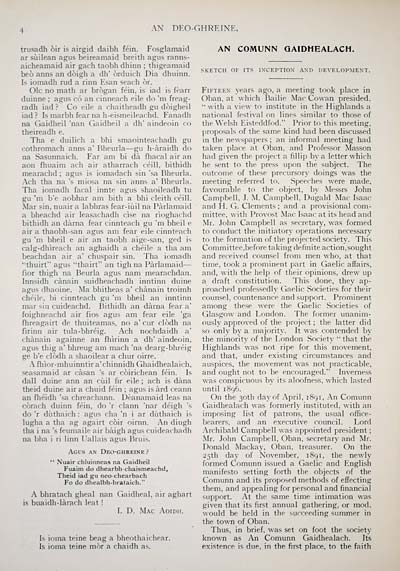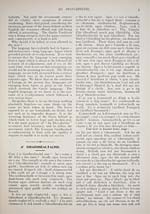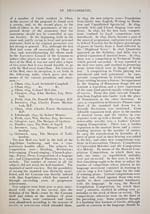Blair Collection > Deo-gréine
(16)
Download files
Complete book:
Individual page:
Thumbnail gallery: Grid view | List view

AN DEO-GHREINE
trusadh òir is airgid daibh fein. Fosglamaid
ar sùilean agus beireamaid breith agus ranns-
aicheamaid air gach taobh dhinn ; thigeamaid
beò anns an dòigh a dh' òrduich Dia dhuinn.
Is iomadh rud a rinn Esan seach or.
Olc no math ar brògan fein, is iad is Fèarr
duinne ; agus cò an cinneach eile do 'm freag-
radh iad? Co eile a chaitheadh gu dòigheil
iad? Ismarbh fearna h-eismeileachd. Fanadh
na Gaidheil 'nan Gaidheil a dh' aindeoin co
theireadh e.
Tha e duilich a bhi smaointeachadh gu
cothromach anns a' Bheurla — gu h-àraidh do
na Sasunnaich. Far am bi dà fhacal air an
aon fhuaim ach air atharrach cèill, bithidh
mearachd ; agus is iomadach sin 'sa Bheurla.
Ach tha na "s miosa na sin anns a' Bheurla.
Tha iomadh facal innte agus shaoileadh tu
gu 'm b'e aobhar am bith a bhi cleith cèill.
Mar sin, nuair a labhras fear-iùil na Pàrlamaid
a bheachd air leasachadh cise na rioghachd
bithidh an dàrna fear cinnteach gu 'm bheil e
air a thaobh-san agus am fear eile cinnteach
gu 'm bheil e air an taobh aige-san, ged is
calg-dhireach an aghaidh a cheile a tha am
beachdan air a' chuspair sin. Tha iomadh
"thuirt" agus "thairt" an tigh na Pàrlamaid —
fior thigh na Beurla agus nam mearachdan.
Innsidh cànain suidheachadh inntinn duine
agus dhaoine. Ma bhitheas a' chànain troimh
. bi cinnteach gu 'm bheil an inntinn
mar sin cuideachd. Bithidh an dàrna fear a'
foighneachd air fios agus am fear eile 'ga
fhreagairt de thuiteamas, no a' cur clòdh na
firinn air tula-bhrèig. Ach nochdaidh a'
chànain againne an fhirinn a dh' aindeoin,
agus thig a' bhreug am mach 'na dearg-bhreig
ge b'e clòdh a shaoilear a chur oirre.
A fhior-mhuinntir a'chinnidh Ghaidhealaich,
seasamaid ar càsan 's ar còirichean fein. Is
dall duine ann an ciiil fir eile ; ach is dàna
theid duine air a chuid fein ; agus is àrd ceann
an fhèidh 'sa chreachann. Dèanamaid leas na
h duinn fèin, do 'r claim 'nar dèigh *s
do 'r dùthaich : agus cha 'n i ar dùthaich is
lugha a tha ag agairt còir oirnn. An diugli
tha i na 's feumaile air bàigh agus cuideachadh
na bha i ri linn Lai la is agus Bruis.
Agls an Deo-ghreine ?
" Nuair chluinneas na Gaidheil
Fuaim do dhearbh-chaismeachd,
Theid iad j£u neo chearbach
Fo do dhealbh-brataich."
A bhratach gheal nan Gaidheal, air aghart
is buaidh-làrach leat !
I. D. Mac Aoidh.
Is ioma teine beag a bheothaichear.
Is ioma teine mòr a chaidh as.
AN COMUNN GAIDHEALACH.
SKETCH or ITS INCEPTION' AND DEVELOPMENT.
Fifteen years ago, a meeting took place in
Oban, at which Bailie Mac Cowan presided,
" with a view to institute in the Highlands a
national festival on lines similar to those of
the Welsh Kisteddfod." Prior to this meeting,
proposals of the same kind had been discussed
in the newspapers ; an informal meeting had
taken place at Oban, and Professor Masson
had given the project a fillip by a letter which
he sent to the press upon the subject. The
outcome of these precursory doings was the
meeting referred to. Speeches were made,
favourable to the object, by Messrs John
Campbell, J. M. Campbell, Dugald Mac Isaac
and H. G. Clements ; and a provisional com-
mittee, with Provost Mac Isaac at its head and
Mr. John Campbell as secretary, was formed
to conduct the initiatory operations necessary
to the formation of the projected society. This
Committee,before taking definite action, sought
and received counsel from men who, at that
time, took a prominent part in Gaelic affairs,
and, with the help of their opinions, drew up
a draft constitution. This done, they ap-
proached professedly Gaelic Societies for their
counsel, countenance and support. Prominent
among these were the Gaelic Societies of
Glasgow and London. The former unanim-
ously approved of the project; the latter did
so only by a majority. It was contended by
the minority of the London Society " that the
Highlands was not ripe for this movement,
and that, under existing circumstances and
auspices, the movement was not practicable,
and ought not to be encouraged." Inverness
was conspicuous by its aloofness, which lasted
until 1896.
On the 30th day of April, 1891, An Comunn
Gaidhealach was formerly instituted, with an
imposing list of patrons, the usual office-
bearers, and an executive council. Lord
Archibald Campbell was appointed president ;
Mr. John Campbell, Oban, secretary and Mr.
Donald Mackay, Oban, treasurer. On the
25th day of November, 1891, the newly
formed Comunn issued a Gaelic and English
manifesto setting forth the objects of the
Comunn and its proposed methods of effecting
them, and appealing for personal and financial
support. At the same time intimation was
given that its first annual gathering, or mod.
would be held in the succeeding summer in
the town of Oban.
Thus, in brief, was set on foot the society
known as An Comunn Gaidhealach. Its
existence is due, in the first place, to the faith
trusadh òir is airgid daibh fein. Fosglamaid
ar sùilean agus beireamaid breith agus ranns-
aicheamaid air gach taobh dhinn ; thigeamaid
beò anns an dòigh a dh' òrduich Dia dhuinn.
Is iomadh rud a rinn Esan seach or.
Olc no math ar brògan fein, is iad is Fèarr
duinne ; agus cò an cinneach eile do 'm freag-
radh iad? Co eile a chaitheadh gu dòigheil
iad? Ismarbh fearna h-eismeileachd. Fanadh
na Gaidheil 'nan Gaidheil a dh' aindeoin co
theireadh e.
Tha e duilich a bhi smaointeachadh gu
cothromach anns a' Bheurla — gu h-àraidh do
na Sasunnaich. Far am bi dà fhacal air an
aon fhuaim ach air atharrach cèill, bithidh
mearachd ; agus is iomadach sin 'sa Bheurla.
Ach tha na "s miosa na sin anns a' Bheurla.
Tha iomadh facal innte agus shaoileadh tu
gu 'm b'e aobhar am bith a bhi cleith cèill.
Mar sin, nuair a labhras fear-iùil na Pàrlamaid
a bheachd air leasachadh cise na rioghachd
bithidh an dàrna fear cinnteach gu 'm bheil e
air a thaobh-san agus am fear eile cinnteach
gu 'm bheil e air an taobh aige-san, ged is
calg-dhireach an aghaidh a cheile a tha am
beachdan air a' chuspair sin. Tha iomadh
"thuirt" agus "thairt" an tigh na Pàrlamaid —
fior thigh na Beurla agus nam mearachdan.
Innsidh cànain suidheachadh inntinn duine
agus dhaoine. Ma bhitheas a' chànain troimh
. bi cinnteach gu 'm bheil an inntinn
mar sin cuideachd. Bithidh an dàrna fear a'
foighneachd air fios agus am fear eile 'ga
fhreagairt de thuiteamas, no a' cur clòdh na
firinn air tula-bhrèig. Ach nochdaidh a'
chànain againne an fhirinn a dh' aindeoin,
agus thig a' bhreug am mach 'na dearg-bhreig
ge b'e clòdh a shaoilear a chur oirre.
A fhior-mhuinntir a'chinnidh Ghaidhealaich,
seasamaid ar càsan 's ar còirichean fein. Is
dall duine ann an ciiil fir eile ; ach is dàna
theid duine air a chuid fein ; agus is àrd ceann
an fhèidh 'sa chreachann. Dèanamaid leas na
h duinn fèin, do 'r claim 'nar dèigh *s
do 'r dùthaich : agus cha 'n i ar dùthaich is
lugha a tha ag agairt còir oirnn. An diugli
tha i na 's feumaile air bàigh agus cuideachadh
na bha i ri linn Lai la is agus Bruis.
Agls an Deo-ghreine ?
" Nuair chluinneas na Gaidheil
Fuaim do dhearbh-chaismeachd,
Theid iad j£u neo chearbach
Fo do dhealbh-brataich."
A bhratach gheal nan Gaidheal, air aghart
is buaidh-làrach leat !
I. D. Mac Aoidh.
Is ioma teine beag a bheothaichear.
Is ioma teine mòr a chaidh as.
AN COMUNN GAIDHEALACH.
SKETCH or ITS INCEPTION' AND DEVELOPMENT.
Fifteen years ago, a meeting took place in
Oban, at which Bailie Mac Cowan presided,
" with a view to institute in the Highlands a
national festival on lines similar to those of
the Welsh Kisteddfod." Prior to this meeting,
proposals of the same kind had been discussed
in the newspapers ; an informal meeting had
taken place at Oban, and Professor Masson
had given the project a fillip by a letter which
he sent to the press upon the subject. The
outcome of these precursory doings was the
meeting referred to. Speeches were made,
favourable to the object, by Messrs John
Campbell, J. M. Campbell, Dugald Mac Isaac
and H. G. Clements ; and a provisional com-
mittee, with Provost Mac Isaac at its head and
Mr. John Campbell as secretary, was formed
to conduct the initiatory operations necessary
to the formation of the projected society. This
Committee,before taking definite action, sought
and received counsel from men who, at that
time, took a prominent part in Gaelic affairs,
and, with the help of their opinions, drew up
a draft constitution. This done, they ap-
proached professedly Gaelic Societies for their
counsel, countenance and support. Prominent
among these were the Gaelic Societies of
Glasgow and London. The former unanim-
ously approved of the project; the latter did
so only by a majority. It was contended by
the minority of the London Society " that the
Highlands was not ripe for this movement,
and that, under existing circumstances and
auspices, the movement was not practicable,
and ought not to be encouraged." Inverness
was conspicuous by its aloofness, which lasted
until 1896.
On the 30th day of April, 1891, An Comunn
Gaidhealach was formerly instituted, with an
imposing list of patrons, the usual office-
bearers, and an executive council. Lord
Archibald Campbell was appointed president ;
Mr. John Campbell, Oban, secretary and Mr.
Donald Mackay, Oban, treasurer. On the
25th day of November, 1891, the newly
formed Comunn issued a Gaelic and English
manifesto setting forth the objects of the
Comunn and its proposed methods of effecting
them, and appealing for personal and financial
support. At the same time intimation was
given that its first annual gathering, or mod.
would be held in the succeeding summer in
the town of Oban.
Thus, in brief, was set on foot the society
known as An Comunn Gaidhealach. Its
existence is due, in the first place, to the faith
Set display mode to: Large image | Transcription
Images and transcriptions on this page, including medium image downloads, may be used under the Creative Commons Attribution 4.0 International Licence unless otherwise stated. ![]()
| Early Gaelic Book Collections > Blair Collection > Deo-gréine > (16) |
|---|
| Permanent URL | https://digital.nls.uk/76697869 |
|---|
| Description | A selection of books from a collection of more than 500 titles, mostly on religious and literary topics. Also includes some material dealing with other Celtic languages and societies. Collection created towards the end of the 19th century by Lady Evelyn Stewart Murray. |
|---|
| Description | Selected items from five 'Special and Named Printed Collections'. Includes books in Gaelic and other Celtic languages, works about the Gaels, their languages, literature, culture and history. |
|---|

